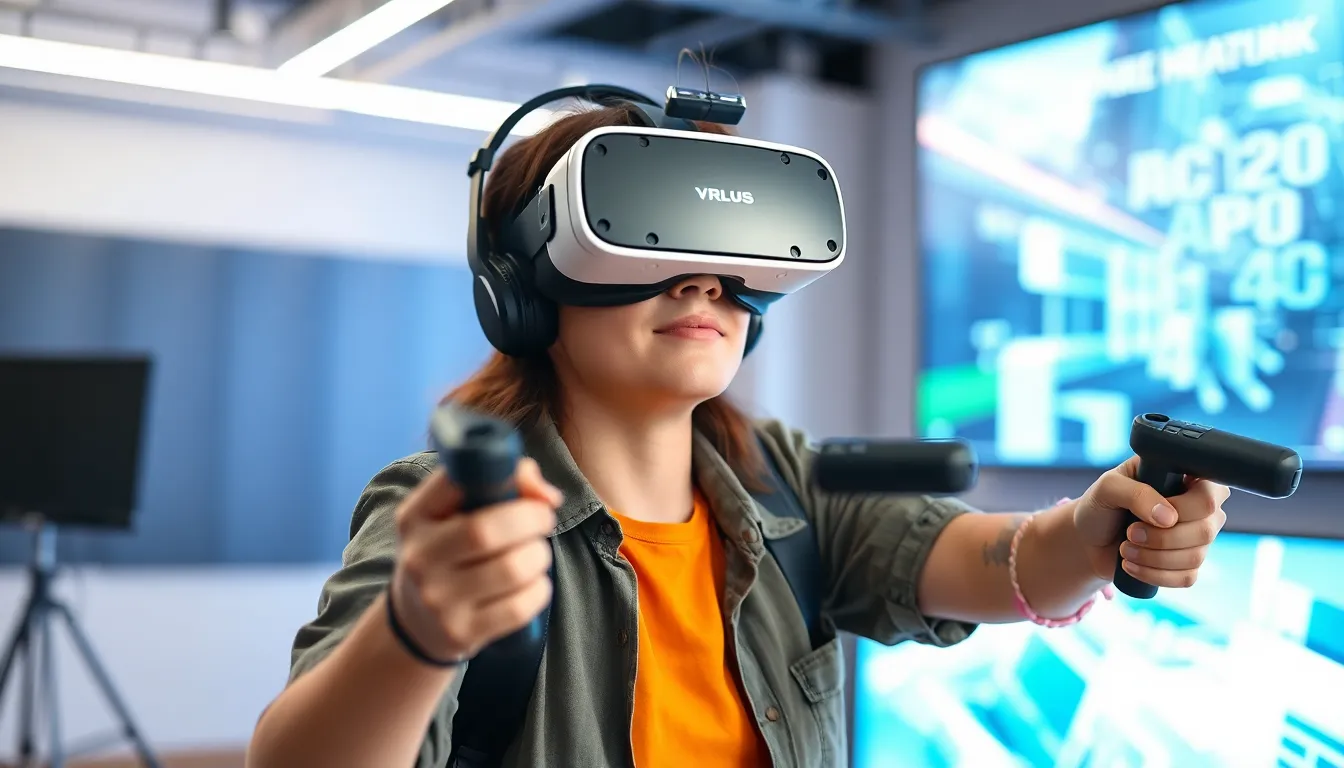Imagine stepping into a world where your wildest dreams come to life. With VR controllers in hand, that dream isn’t just a fantasy—it’s a reality. These sleek gadgets not only transport users to breathtaking virtual realms but also give them the power to interact with their surroundings like never before. Whether it’s slaying dragons or painting masterpieces, VR controllers are the magic wands of the digital age.
Table of Contents
ToggleOverview of VR Controllers
VR controllers serve as vital components in the immersive virtual reality experience. Designed for interaction, these devices enable users to manipulate objects and navigate environments seamlessly. Different types of controllers cater to varied user preferences, ranging from handheld models to more advanced gloves equipped with haptic feedback.
Popular brands in the VR space include Oculus, Valve, and HTC, each offering unique features. Oculus Quest 2 controllers boast intuitive designs with touch-sensitive controls, while Valve Index controllers enhance precision with finger tracking. HTC Vive controllers deliver a balanced combination of ergonomics and durability.
Users experience enhanced engagement through specific functionalities. Motion tracking allows for realistic interactions, ensuring a closer resemblance to real-life movements. Gyroscopic sensors enhance controller accuracy, creating smoother gameplay experiences. With vibrating feedback, users feel actions in the virtual world, deepening immersion.
Selecting the right VR controller depends on personal requirements, including game compatibility and physical comfort. Some users prefer heavier controllers for a sense of stability, while others might opt for lighter ones that promote extended use without fatigue. Exploring compatibility with different VR headsets ensures optimal enjoyment and performance.
As technology advances, VR controllers evolve to incorporate new elements. Upcoming models promise improvements in accuracy and ease of use, further enriching the user experience in virtual environments. By leveraging cutting-edge technology, developers continually enhance the way users engage with their virtual worlds.
Types of VR Controllers

Virtual reality controllers come in several types, each designed to enhance the user experience in unique ways. These devices include motion controllers, gamepads, and specialized gloves.
Motion Controllers
Motion controllers track hand movements, allowing users to interact within virtual spaces naturally. Most models utilize gyroscopic sensors and accelerometers to detect orientation and movement. Notable examples include the Oculus Touch and HTC Vive Wand, both offering nuanced control for gameplay and exploration. Users appreciate tactile feedback, which adds to the sense of immersion. With interactive capabilities like gesture recognition, these controllers accommodate a wide range of VR applications, from action games to simulations.
Gamepads
Gamepads provide a more traditional gaming experience but adapt to the VR realm effectively. They come equipped with various buttons and analog sticks, ensuring precision navigation and control within virtual worlds. Popular options include the PlayStation VR Aim Controller and the Oculus Gamepad. Gamepads are particularly beneficial for users familiar with console gaming, as they replicate similar control schemes. Ease of use and accessibility cater to casual players while maintaining functionality for serious gamers. Compatibility with multiple platforms enhances their appeal, making them a versatile choice.
Gloves and Specialized Devices
Gloves and specialized devices offer advanced interaction capabilities for VR experiences. These devices often include haptic feedback, which allows users to “feel” virtual objects. Some gloves come with unique features like finger tracking and grip detection, providing a more immersive experience. Examples include the HaptX Gloves and Manus VR Gloves, designed for both personal and professional use. Applications range from gaming to training simulations, proving useful in various fields. As technology advances, these controllers will likely evolve, offering even greater tactile interactions.
Key Features to Consider
When selecting VR controllers, several features significantly impact the user experience.
Tracking Technology
Tracking technology plays a pivotal role in VR interactions. Controllers utilizing motion sensors provide accurate tracking of hand movements, enabling fluid gameplay. Advanced gyroscopic sensors enhance this experience by capturing intricate movements. An example is the Oculus Touch, known for its precision and responsiveness. Controllers featuring inside-out tracking eliminate the need for external sensors, offering ease of use. Brands continually improve this technology, ensuring players feel immersed in virtual environments.
Ergonomics and Comfort
Ergonomics and comfort are vital for prolonged VR sessions. Controllers designed with user comfort in mind minimize fatigue and enhance engagement. Adjustable grip sizes appeal to a wider range of users, accommodating different hand shapes. Lightweight materials contribute to comfort during extended gameplay. For instance, some controllers include cushioned grips that reduce pressure on the hands. Ensuring users can play without discomfort increases satisfaction and immersion in VR experiences.
Compatibility with VR Systems
Compatibility with various VR systems is essential for a seamless experience. Controllers often support specific platforms, such as Oculus or PlayStation VR, limiting cross-compatibility. Users must consider game compatibility when selecting a controller, as some titles may only support specific devices. Brands like HTC ensure their controllers work seamlessly with a broader range of systems, increasing versatility. Always check compatibility with the desired VR system to prevent purchasing issues.
Popular VR Controllers on the Market
Various VR controllers capture user interest with their distinct features and capabilities. Each model brings unique advantages to enhance virtual experiences.
Oculus Touch
Oculus Touch controllers set a standard with their immersive design. Offering accurate motion tracking, these controllers utilize advanced sensors to replicate hand movements. Users benefit from ergonomic shapes that provide comfort during extended sessions. Haptic feedback adds a layer of realism, allowing players to feel the virtual environment more vividly. Compatibility with Oculus Rift and Quest systems reinforces its popularity among users seeking engaging gameplay.
Valve Index Controllers
Valve Index Controllers distinguish themselves with finger tracking technology. This feature allows for natural hand gestures and precise interactions within virtual spaces. Designed with adjustable straps, they ensure a secure fit, accommodating various hand sizes. Enhanced haptic feedback offers responsive sensations, boosting immersion during gameplay. Users appreciate the high build quality, making them a durable choice for dedicated gamers.
PlayStation VR Aim Controller
PlayStation VR Aim Controller provides a blend of traditional gaming familiarity and VR innovation. Shaped like a gun, it appeals to users focused on shooter experiences in virtual reality. Integrated motion sensors track aim and movement, ensuring accuracy during gameplay. Additionally, the weighted design enhances control and stability. This controller is compatible with a range of PlayStation VR titles, making it a versatile option for fans of immersive gaming.
VR controllers are revolutionizing how users interact with virtual environments. Their ability to provide immersive experiences and intuitive controls makes them indispensable for gamers and creators alike. As technology continues to evolve, these devices are set to become even more advanced, enhancing realism and engagement in virtual worlds.
Selecting the right VR controller is crucial for maximizing enjoyment and comfort. With various options available, users can find controllers that suit their preferences and gaming styles. The future of VR controllers holds exciting possibilities, promising to further bridge the gap between reality and the digital realm.



